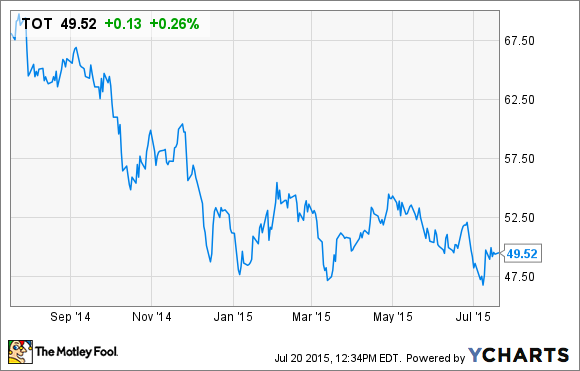It's no secret that French oil major Total SA (NYSE: TOT) has taken it on the chin in the past year. As the following chart indicates, shares have been badly beaten down.
Of course, the key culprit for this is the falling price of oil. Brent crude, the international benchmark, is down to $57 per barrel, and traded above $100 per barrel at this point in 2014. The commodity crash has clearly sunk oil majors' profits, and Total is no exception. But the downturn has created what appears to be a very good buying opportunity for long-term Fools.
Total has significant projects that are set to fuel its future growth, if and when oil prices recover. And in the meantime, Total is a cheap stock that offers an attractive dividend yield that exceeds 5%. For these reasons, there's a lot of value and income potential in Total.
Keeping its head above water
There's no denying that Total's fundamentals have deteriorated in recent periods due to the collapse of oil and gas prices. Total's net profit fell 22%, to $2.6 billion, last quarter, year over year. This is surely poor performance; but it wasn't as bad as it could have been. On a quarter-over-quarter basis, Total's upstream profits decreased 15%, which is far less than the 30% drop in Brent crude prices in the same period.
The reasons why Total's upstream unit performed relatively well in the face of plunging oil and gas prices is that the company is aggressively cutting costs. Total is targeting $800 million in lower upstream costs this year by reducing operating expenses.
Another reason for Total's stronger upstream results is that it increased production. Total's overall production grew 10% last quarter, year over year.Contributing to Total's higher production were the three start-ups in the first quarter, West Franklin Phase 2 and Eldfisk II in the North Sea, starting natural gas production at Ofon 2 in Nigeria, as well as strong production at Total's CLOV deep offshore development in Angola.

CLOV development. Source: Total website.
Separately, Total is seeing great results from its deep offshore Block 17, located off the coast of Angola, where Total operates and controls a 40% stake. In fact, Block 17 has become Total's most productive area, with production of more than 700,000 barrels per day.
The bottom line is that Total is accelerating production across a number of its key projects. While this is not benefiting Total right now, because commodity prices are declining, Total may be one of the first to see a bounce-back if oil and gas prices recovery over the remainder of 2015.
And, Total is seeing stronger downstream performance, a direct benefit of the integrated model. Total operates a large refining business, and this is very helpful when oil prices fall because refining profits rise during these times.This year, Total's downstream business was threatened because it was getting under-cut by exports of refined products from the U.S. Gulf Coast. Fortunately, Total will combat this by reducing its European refinery capacity by 20% and will reduce breakeven costs of each of its European refineries to less than $20 per ton by 2017. And, it plans to reduce refining costs by $600 million by then.
Moreover, the general rising tide of refining more broadly is benefiting Total. Its downstream profits tripled last quarter, year over year, to $1.1 billion. Overall utilization rose five percentage points year over year, to 88%, and refinery throughput increased 14%, to 1.9 million barrels per day.
The dividend is a top priority
Total's profits are in decline, and will stagnate until there is a recovery in underlying oil and gas prices. However, at the very least, Total is a cheap stock that pays investors very well to wait for the turnaround. Total shares trade for 1.14 times book value, and just 4.9 times enterprise value to EBITDA.
In addition, Total's dividend yields in excess of 5%, and management is committed to its payout. The company stated on the last quarterly earnings conference call that it expects to fully cover the dividend with free cash flow by 2017.
While there's no guarantee when or if oil and gas prices will rise once again, Total is taking the necessary steps to protect its dividend no matter what. The company is cutting costs, selling non-critical assets, and continuing to ramp up production. At worst, Total's 5% dividend is a great consolation prize if share price continues to decline, but there is lots of upside potential if commodity prices recover.





